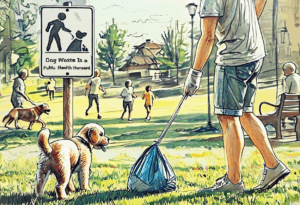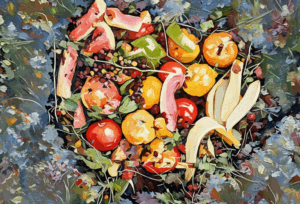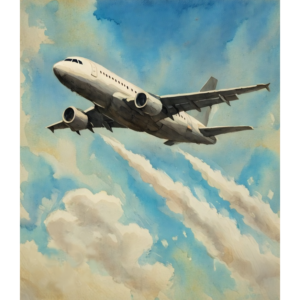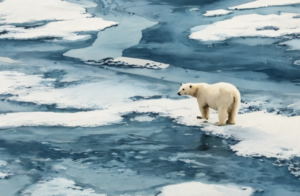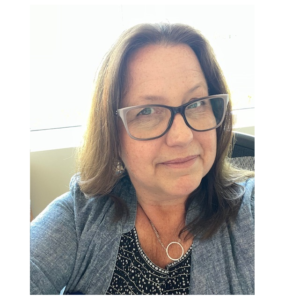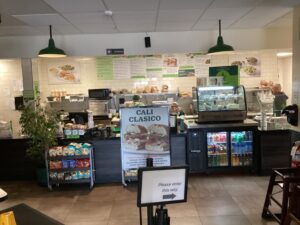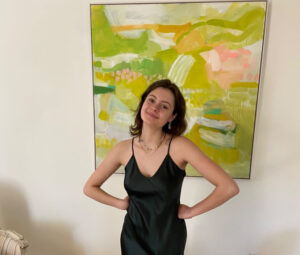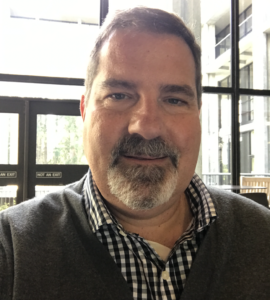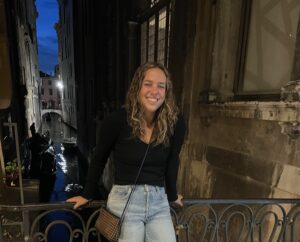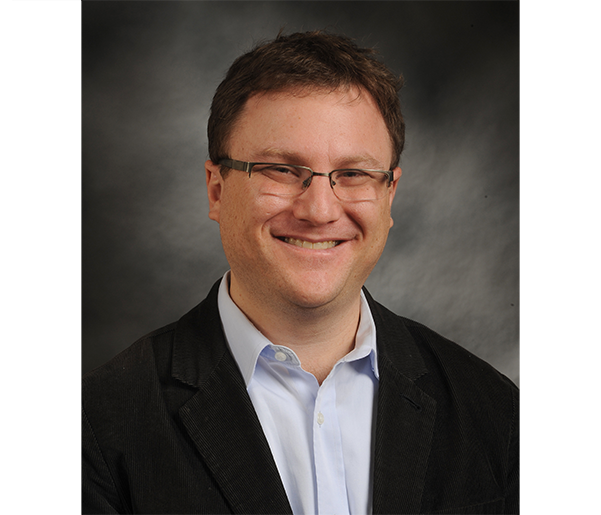
Professor Ryan Poll teaches English at Northeastern Illinois University in Chicago, IL. One of his classes, global ecologies, focuses on the potential and power literature has to influence the general public’s perspectives on climate change – what he calls climate collapse.
Dr. Poll spoke with the Earth Chronicles about the power of acknowledging that everything is interconnected, the importance of creativity in any field, as well as how his class takes steps – and how the public can begin – to shift their attitudes about the climate collapse.
The interview approached an hour in duration and has been condensed where appropriate. Questions and answers were lightly edited for clarity and conciseness.
Jiaming: For anyone not familiar with the term, how do you define a “global ecology”?
Dr. Poll: I think it’s really interesting that there’s this idea of nature as fixed or historical. That’s a really dangerous idea because that’s the sort of idea that lets us pollute the forest, thinking it will grow back as if it’s independent; as if we’re in history, but nature’s outside of that history.
So ecology comes in – in the way that we’re all embedded and interrelated. Like you say “I want to go experience nature,” as if we’re ever removed from it. In ecology, there’s nature all around us.
The very concept of nature is that it’s something that’s removed, that’s distant, that’s outside. The idea of ecology dissolves that concept of nature, in the way that we’re inextricable from our environments and from all other species.
Jiaming: Does the idea of ecology apply to non-nature, non-plant things? Can I say it about a classroom?
Dr. Poll: Absolutely. Think about social ecologies. There’s multiple scales, and we think about animals on a larger scale. But bacteria are part of nature too, right? So [in] what spaces are we not [part of nature]?
If we think there’s ever a space free of nature, we could be wrong. We might get a type of cancer in three decades from the asbestos in buildings because we’ve been in spaces where we weren’t thinking about nature.
Healthy ecologies look at multiple scales. So, we should never stop thinking about ecology, and there’s no spaces that are outside of ecology.
Jiaming: That’s a very powerful statement. I’m reminded of the way parking lots are designed. Trees and shrubs are arranged a certain way so they can collect enough rain to keep the asphalt from over-flooding.
Dr. Poll: This is all about design. Growing up in a city, living in an area that’s all asphalt, means some kids have never touched grass. Because there’s no connection, there’s a sort of alienation from other life forms. We designed spaces that remove us from what we call nature. We created colleges that are more designed for automobiles than people – this has everything to do with how we think about nature.
One of the things I like to teach is what it means to say that “we’re living through.” I don’t think it’s controversial to say we’re in the midst of unprecedented climate change. I think it’s better called the sixth great extinction; hundreds of species are going extinct every day. There’s species collapse happening all around us. And this is where literature comes in: how do we create those narratives? To make us aware and make those visible?
Like, it’s really hot now. But if it cools off in 20 minutes, I’ll forget about the heat, right? So how do we tell the stories that foreground what we’re in the midst of?
I mean, I like to call it “climate collapse.” Climate change doesn’t capture the core of what we’re experiencing. Species loss, ecology loss, rising temperatures – really, it’s an apocalypse.
Now, how do you begin to focus on it? How do you begin to narrate it? How do we begin to tell the stories that capture it?
This goes back to the idea of why the class I teach is called “global ecologies.” It’s the scale – we can’t just tell stories about our home, or just one contained place. All ecologies are connected. The pollution happening over here is going to affect life over there. The stuff we buy on our shelves is made overseas.
So many of the stories we tell still follow Aristotle’s Poetics: one protagonist; one visible antagonist; it should unfold in 24 hours; it should happen within a contained place. But that’s a fiction we can’t afford anymore.
Jiaming: I remember, in an earlier conversation, you talked about the need to tell stories from the perspective of birds and animals, from all of these species that are going extinct – that is, from species we don’t think about. And we don’t do it. But you teach this as a class – how do you do it? How do you structure the class? What do you cover?
Dr. Poll: One of the important things I do with all my classes, but especially as a global ecologist, is to have a creative aspect. Like, write a poem or a story or a short play, from the perspective of any animal or plant or tree that’s within a 20 mile radius of where we are. They’ll begin thinking creatively.
Another thing: we know how scary this is and how apocalyptic it is. But I really want to always have texts that give a sense of hope, or joy, or possibility, or why it’s important to love. We looked at Miyazaki’s animated Spirited Away, and even just turning to unexpected spaces and countries, I think the class was surprised they could make connections between the movie and the conceptual terms we’re learning or connect their lives to the movie. Again, this goes back to doing surprising things or creative things.
I also introduce different ways to read assignments. When dealing with challenging text, or even the movie, because it doesn’t follow conventions of beginning-middle-end, I asked students to take five minutes to write down their ten most interesting observations. Like, you do the first five minutes, the next person does the next five minutes, so everyone’s helping each other take notes. And if we think about ecology as everything being interconnected, how do we collectively start to write papers or learn from each other? That’s another thing we do.
Jiaming: I’m aware you’ve taught this class both in person and online. Anything noteworthy of the difference or anything you go out of your way to do for both classes?
Dr. Poll: Well, I spend a lot of time putting together like, really rich PowerPoints with quotes and visuals and unexpected stuff. There’s always opportunities to ask questions. It’s like making ecologies where people are able to participate.
Every class, I introduce students to one kind of philosophical concept, try to make them love something about literature, about visual culture… the most successful classes become surprising to everyone involved. And that’s an ecological thing too. When you’re really thinking ecologically, there should always be innovation and surprises – because when you really study the world in all its specificity and details, it’s wondrous. It’s thrilling.
Jiaming: Sounds like I need to take this class… there are so many different things at play.
Dr. Poll: If I can add one more thing, Aristotle still shapes our thinking of literature. He identified the four key things to make a good story. One is having a protagonist: who’s in the main story? Then, what’s the main theme? And what’s the plot? But there’s a fourth thing that’s just as important as plot, character, and theme: place. Where does the story take place?
And I think what’s interesting is, in America, we don’t think about place. We don’t think about the environment. Even the words we use to describe place, like “background” or “setting,” have the connotation that it’s something you skip over.
Something else I do in my class: how do different places and spaces shape characters? How do they shape the decisions you make, shape who you can fall in love with?
I love this idea that place is as important as character. Think about The Great Gatsby; where does garbage go? All this food that’s being consumed in spaces of wealth in The Great Gatsby is ending up in dumps.
We so little [sic] pay attention to place, and it becomes a different way to read books.
Jiaming: How do you start getting people to care or want to know more? Does literature have anything to do with that?
Dr. Poll: One important concept to think about is the concept of desserts – you hear about food deserts and health deserts, but what about wilderness desserts?
There might be nature all around us, but the experience of wilderness – places that are beyond the human – should be readily available and radically democratic. Like, if after lunch, kids spent 45 minutes walking in the wilderness, just learning to observe, or doing science – not just in labs in the classroom – but in the world. It should be like that. But what does it mean that we’re so alienated from the natural world, even in our education? The outside should be part of our education.
It’s so important to create a world that young people have access to – one where they can say “I love the natural world.” I mean, we could almost forget it exists, right? It seems like we have no relationships with the species that are going extinct. It’s not part of everyday stories. We’re so alienated from it.
And then I get this idea that everything’s connected and literature has to be part of it. It’s about the stories we tell. People may say they don’t like science, but science is about stories – how do we use our classes to tell different stories about our relationship to nature? And if you want to be really creative with literature, write a poem about how your identity is inextricable from a bird – in a lot of ways, your lives are linked. It teaches us new perspectives, which does change our ethical behavior. Students have told me, “Thank you, Dr. Poll, I never look at trees the same way,” which can seem so simple, but it’s so profound.
I think the way out of this crisis, or if there’s a way out, is that we have to radically change our economy. We also need to recommit our relationship to the wider natural world, and not be alienated from it. So the more we can immerse ourselves every day, the more we’ll see its benefit on our mental health, our thinking – everything.
Jiaming: Jumping back on what you said about literature’s appeal in other fields, I feel like that has a lot to do with how you tell it. And so part of what goes into that is the words you use. So what you’re getting at is, even if people say they’re not an “English person” or a literature fan, this still applies to them just as much, right?
Dr. Poll: Yeah! You’re thinking about the materiality and the connection of language in that it’s not just a page, but it’s how you relate to the world.
I love the ecological theory of language. How do we have words that connect us to the world rather than words that withdraw us? Language and art should make us feel alive, feel more lives, feel more connected to the world.
Jiaming: As you said, words are meant to be expressed and shared – it’s all about connection. Is there anything else you’d like to end on?
Dr. Poll: It’s so important for us to think about ecology as our relationship to place. There’s a distinction between spaces and places: places are unique and singular. They have memories for us. But spaces, this is a category. It’s almost capitalist; it’s something you don’t think about – something that can be substituted.
We use this category all the time. It’s like the difference between a house and a home: a home is what you love, and it’s singular. There are memories and values embedded there. A house is just a space. It doesn’t matter what block it’s on; it can be replaced.
If I want to have a rich ecological imagination, it’s to see the world as comprised of different places. It’s about having more places in your life, and learning to see spaces as places. To see spaces as places is to see all the history there, and then not only do you start to respect those places, you start to notice things, pay attention to them, and have a more loving relation to them.
It’s a cool way to start a paper.
The views and opinions expressed are those of the authors and do not necessarily reflect nor represent the Earth Chronicles and its editorial board.
